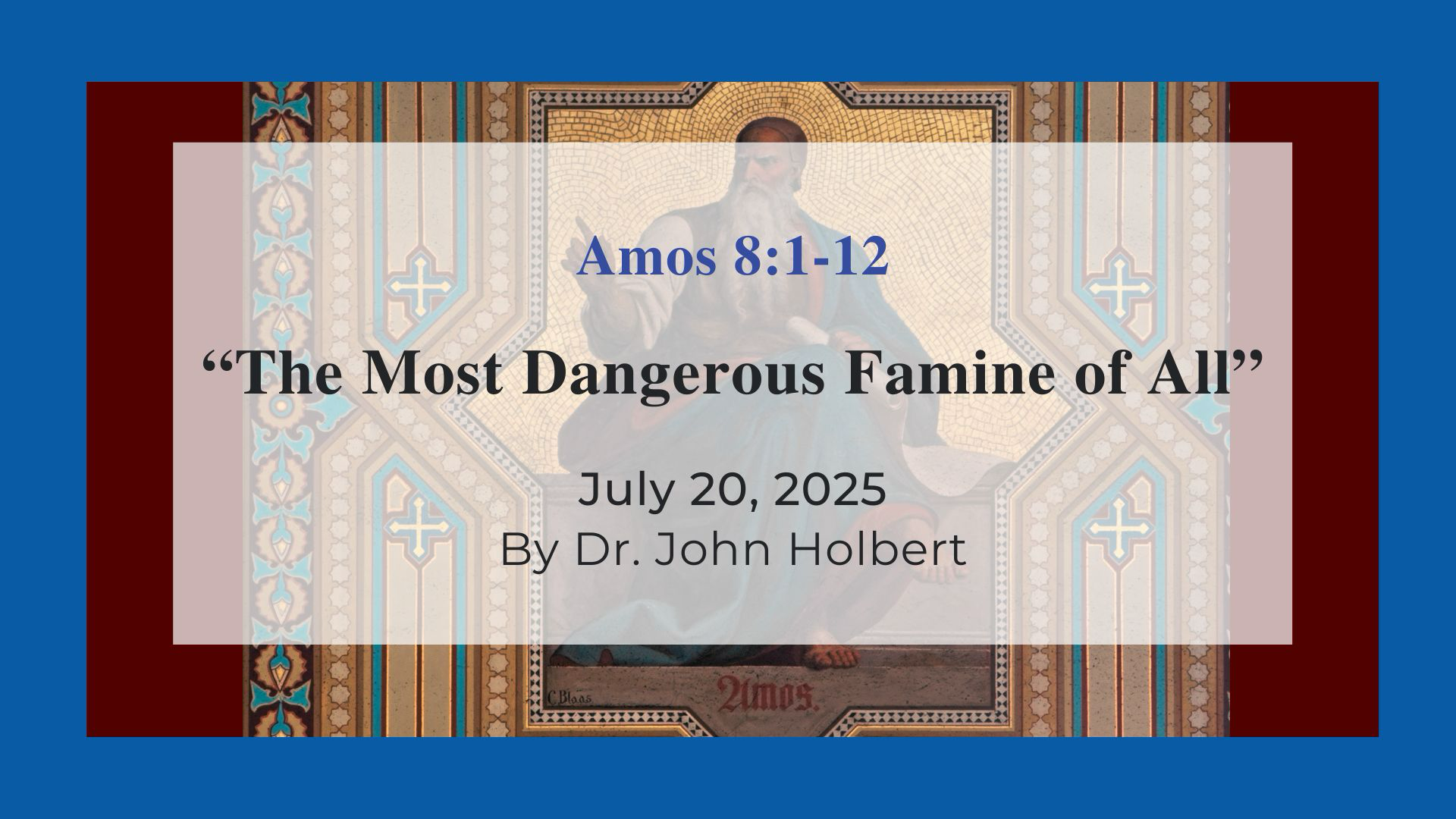The Most Dangerous Famine of All - Reflections on Amos 8:1-12, Pentecost 6, Year C
by John C. Holbert on Thursday, May 15, 2025

Amos 8 is an exceptionally rich passage, including at least three separate ideas, each of which is critical to this prophet’s powerful message. The first concludes Amos’ metaphorical warnings to Israel of YHWH’s anger at their refusal to listen to what God has demanded of them; he employs the images of locusts, fire, and plumb line, and caps it off with the sharp sound pun of a basket of summer fruit,qayits in Hebrew, that calls to mind the Hebrew for “end” (qetz)—Amos 8:1-3. The usually positive appearance of fruit in the sanctuary is undercut by the negative notion of a dark end for Israel. In short, Israel may feel safe from God’s anger as it basks in the bounty of another wonderful fruit harvest, but lurking in the background lies the terrifying end of the nation about to be wrought by a furious God.
The second idea appears in Amos 8:4-6 where the prophet paints a cruelly comic portrait of two criminal traders, sitting in the back of the Bethel sanctuary, haggling over the delayed possibilities of getting back to the cheating of their customers. All that matters to these reprobates is an early end to the seemingly endless worship with its confounded song and sermon, all of which gets in the way of their dishonest mercantile activities. Amos pictures the scene with genuine brilliance.
“When will the new moon (the monthly festival) be over so that we may sell grain,” the two mutter, whispering loudly over the sounds of holy worship. These cursed priests never seem to know when to shut up! “When will the sabbath cease, so we can offer wheat for sale?” We long to get back to business, and as long as worship continues, we are not allowed to do what we love, namely pile up the shekels. Are these priests unaware of the need for the markets to function in order to insure the survival and success of our city? Well, it turns out that these two rascals are decidedly not common merchants.
“We will make the ephah small and the shekel great,
and practice deceit with false scales,
buying the poor for silver
and the needy for a pair of sandals,
all by selling the filth of the wheat” (Amos 8:5b-6)
A sharper painting of a pair of thieves can hardly be imagined! These two, anxious to get back to devious practices in the marketplace, eager to escape the droning service, will operate in their fallacious shops by “making ephah small and shekel great,” that is making sure the balances used for measurement are rigged against the sellers, all to allow the shysters to make extra money for human trafficking, snatching poor folk for silver, falsely gained, and the needy for the price of a pair of shoes. Amos makes it crystal clear that these ugly actions lead directly to “trampling on the needy, and bringing ruin to the land’s poorest” (Amos 8:4).
The third important idea may be found in Amos 8:11-12, and it may be the most frightening idea of all.
“The time is surely coming, says YHWH God,
when I will send a famine on the land;
Not a famine of bread, or a thirst for water,
but of hearing the words of YHWH.”
When a nation seeks desperately for God’s word, but can no longer find it, that lack may well mark the end of that nation. God’s word of justice, compassion, and righteousness form the foundation of any thriving and successful community, and when that word is spoken no more, when prophets disappear from the land, despair and defeat and destruction will not be far behind.
I find this “famine of the word” chilling, and see it in our own time. Many so-called Christians in US America seek power and authority under the pretense of God’s affirmation. Yet, those persons imagine God has willed for them financial success, political power, and an authority that allows them to lord it over others who have little, namely the poor and marginalized of the land. We today need our true prophets, those who represent the true God who wills a loving community for God’s people, not a divided society that excludes and abuses those who have limited access to the levers of power. We must always look for our prophets in order to insure the existence of God’s genuine word among us, lest we suffer the terrors that Amos portrays in such vivid language: “I will turn your feasts into mourning, all your songs into lamentation; I will place sackcloth on all loins, and baldness on every head; it will be like a mourning for an only son, and the end of it all like a bitter day” (Amos 8:10). Harsh words, indeed, but metaphors that depict a land without God’s word. May it never be so!
